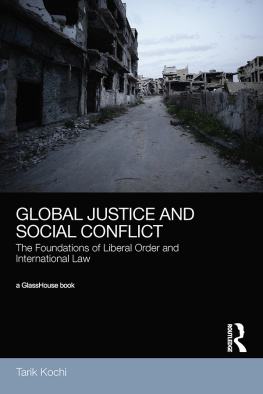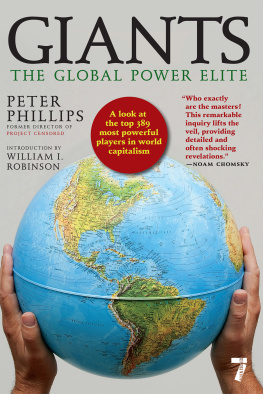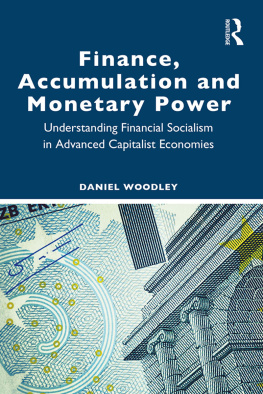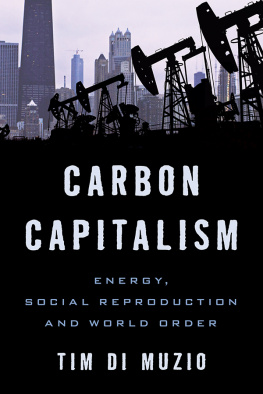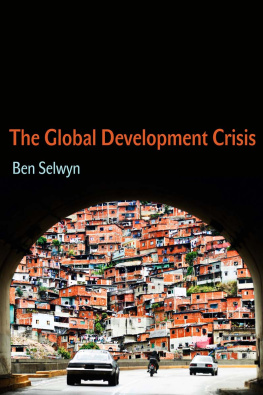The Poverty of Capitalism
The Poverty
of Capitalism
Economic Meltdown and the
Struggle for What Comes Next
John Hilary

First published 2013 by Pluto Press
345 Archway Road, London N6 5AA
www.plutobooks.com
Distributed in the United States of America exclusively by
Palgrave Macmillan, a division of St. Martin's Press LLC,
175 Fifth Avenue, New York, NY 10010
Copyright John Hilary 2013
The right of John Hilary to be identified as the author of this work has been asserted by him in accordance with the Copyright, Designs and Patents Act 1988.
British Library Cataloguing in Publication Data
A catalogue record for this book is available from the British Library
ISBN 978 0 7453 3331 1 Hardback
ISBN 978 0 7453 3330 4 Paperback
ISBN 978 1 8496 4966 7 PDF eBook
ISBN 978 1 8496 4968 1 Kindle eBook
ISBN 978 1 8496 4967 4 EPUB eBook
Library of Congress Cataloging in Publication Data applied for
This book is printed on paper suitable for recycling and made from fully managed and sustained forest sources. Logging, pulping and manufacturing processes are expected to conform to the environmental standards of the country of origin.
10 9 8 7 6 5 4 3 2 1
Typeset from disk by Stanford DTP Services, Northampton, England Simultaneously printed digitally by CPI Antony Rowe, Chippenham, UK and Edwards Bros in the United States of America
Contents
Acknowledgements
This book is a study of poverty, power and injustice in the global political economy of the twenty-first century. It is intended to complement the numerous studies that War on Want has published over the course of its 60-year history into the root causes of poverty around the world, beginning with the original War on Want: A Plan for World Development drawn up in 1952. In all these endeavours, the aim has been to look beyond outward symptoms and to identify the underlying social, political and economic forces that deny people the right to decent lives of personal fulfilment, free from the threat of hunger, violence or despair. The current book builds on six decades of active learning not only on the part of War on Want and its many partners, allies and affiliates, but by all who have joined in the struggle for social justice across the world.
On a personal level, this book is the culmination of 25 years working in the global justice movement, and as such it will be impossible to pay proper tribute to all those who have helped develop my understanding along the way. Firstly, I would like to thank those with whom I have worked over the past ten years at War on Want. From the trustee body, I particularly wish to thank Steve Preston, Sue Branford, Polly Jones, Guillermo Rogel, Gaynelle Samuel, Mark Luetchford and David Hillman for their encouragement, as well as War on Want president Rodney Bickerstaffe for his constant personal support. I also wish to thank all those who have worked on the staff with me for their dedication and commitment, and for proving time and again the power of conviction to bring about change.
From earlier days in the fight against the WTO and other institutions of neoliberal globalisation, I had the privilege of working alongside some of the most inspiring individuals in the movement: Martin Khor, Meena Raman and others from the Third World Network; Walden Bello, Aileen Kwa and all from Focus on the Global South; Naomi Klein, Susan George, Maude Barlow, Tony Clarke and other activists from the Our World Is Not For Sale coalition, as well as many good friends from its European wing, the Seattle to Brussels Network. I have also had the good fortune to work with numerous inspiring individuals in the international labour movement, as well as from many other groups not listed here. I am truly grateful to all.
As for those who have helped with the book itself, I would like to register my gratitude to Roger van Zwanenberg, whose idea it was in the first place, David Shulman, Jonathan Maunder, Melanie Patrick and all the team at Pluto Press. I also wish to thank those who have helped with individual aspects of the book, including Mark Curtis, Peter Fuchs, Kate Ives and Ian Richardson. I would like to express my particular thanks to Andreas Bieler, Puneet Dhaliwal and Doreen Massey for their generosity in reading parts of the text in manuscript, and for their immensely helpful comments. All remaining failures are, of course, mine alone.
The greatest privilege of working in the global justice movement for so many years has been the opportunity to meet people from across the world who have devoted their lives to the struggle for a better future, often in situations of great personal danger. Several of these are partners of War on Want in countries such as Brazil, Sri Lanka, Mozambique, South Africa, Zambia, Palestine, Bangladesh, Colombia or Honduras, to name a few. Hearing the same basic tale of exploitation and dispossession told again and again from so many different contexts brings home the poverty of capitalism in a way that the written word alone could never do: from women factory workers whose health has been broken through endless hours of labour for poverty pay; plantation workers condemned to the stress of perpetual insecurity on casual labour contracts; members of communities that have been evicted at gunpoint so as to make way for the next big capitalist venture on their land. This book is an attempt to reveal this reality to a wider audience, and to argue for a future beyond capitalism. It is dedicated with love to Jan, my soulmate and my inspiration throughout every one of the last 25 years.
John Hilary
June 2013
Abbreviations
AATF | African Agricultural Technology Foundation |
ADIA | Abu Dhabi Investment Authority |
AGRA | Alliance for a Green Revolution in Africa |
ALBA | Bolivarian Alliance for the Americas |
ASEAN | Association of South-East Asian Nations |
BASD | Business Action for Sustainable Development |
BIT | bilateral investment treaty |
BRICS | Brazil, Russia, India, China, South Africa |
CAFTA | Central America Free Trade Agreement |
CBI | Confederation of British Industry |
CELAC | Community of Latin American and Caribbean States |
CIA | Central Intelligence Agency |
CIC | China Investment Corporation |
CNOOC | China National Offshore Oil Corporation |
CNPC | China National Petroleum Corporation |
CSR | corporate social responsibility |
DFID | Department for International Development (UK) |
EITI | Extractive Industries Transparency Initiative |
EPA | Economic Partnership Agreement |
ERT | European Round Table of Industrialists |
ETI | Ethical Trading Initiative |
EU | European Union |
FAO | Food and Agriculture Organisation of the United Nations |
FDI | foreign direct investment |
FLA | Fair Labor Association |
FTA | free trade agreement |
Next page

